#AI Tools for Predicting Risk of Genetic Diseases
Text
Fascinating Role of Genomics in Drug Discovery and Development
This article dives deep into the significance of genomics in drug discovery and development, highlighting well-known genomic-based drug development services that are driving the future of pharmaceutical therapies. #genomics #drugdiscovery
A scientist using a whole genome DNA sequencer, in order to determine the “DNA fingerprint” of a specific bacterium. Original image sourced from US Government department: Public Health Image Library, Centers for Disease Control and Prevention. Under US law this image is copyright free, please credit the government department whenever you can”. by Centers for Disease Control and Prevention is…
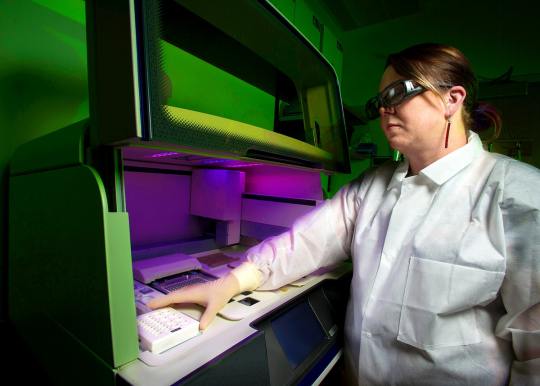
View On WordPress
#AI Tools for Predicting Risk of Genetic Diseases#Artificial Intelligence and Genomics#Role of Genomics and Companion Diagnostics#Role of Genomics in Biomarker Discovery#Role of Genomics in Drug Discovery and Development#Role of Genomics in Drug Repurposing#Role of Genomics in Personalized Medicine#Role of Genomics in Target Identification and Validation#Role of High-Throughput Sequencing
0 notes
Text
AI & IT'S IMPACT
Unleashing the Power: The Impact of AI Across Industries and Future Frontiers
Artificial Intelligence (AI), once confined to the realm of science fiction, has rapidly become a transformative force across diverse industries. Its influence is reshaping the landscape of how businesses operate, innovate, and interact with their stakeholders. As we navigate the current impact of AI and peer into the future, it's evident that the capabilities of this technology are poised to reach unprecedented heights.
1. Healthcare:
In the healthcare sector, AI is a game-changer, revolutionizing diagnostics, treatment plans, and patient care. Machine learning algorithms analyze vast datasets to identify patterns, aiding in early disease detection. AI-driven robotic surgery is enhancing precision, reducing recovery times, and minimizing risks. Personalized medicine, powered by AI, tailors treatments based on an individual's genetic makeup, optimizing therapeutic outcomes.
2. Finance:
AI is reshaping the financial industry by enhancing efficiency, risk management, and customer experiences. Algorithms analyze market trends, enabling quicker and more accurate investment decisions. Chatbots and virtual assistants powered by AI streamline customer interactions, providing real-time assistance. Fraud detection algorithms work tirelessly to identify suspicious activities, bolstering security measures in online transactions.
3. Manufacturing:
In manufacturing, AI is optimizing production processes through predictive maintenance and quality control. Smart factories leverage AI to monitor equipment health, reducing downtime by predicting potential failures. Robots and autonomous systems, guided by AI, enhance precision and efficiency in tasks ranging from assembly lines to logistics. This not only increases productivity but also contributes to safer working environments.
4. Education:
AI is reshaping the educational landscape by personalizing learning experiences. Adaptive learning platforms use AI algorithms to tailor educational content to individual student needs, fostering better comprehension and engagement. AI-driven tools also assist educators in grading, administrative tasks, and provide insights into student performance, allowing for more effective teaching strategies.
5. Retail:
In the retail sector, AI is transforming customer experiences through personalized recommendations and efficient supply chain management. Recommendation engines analyze customer preferences, providing targeted product suggestions. AI-powered chatbots handle customer queries, offering real-time assistance. Inventory management is optimized through predictive analytics, reducing waste and ensuring products are readily available.
6. Future Frontiers:
A. Autonomous Vehicles:
The future of transportation lies in AI-driven autonomous vehicles. From self-driving cars to automated drones, AI algorithms navigate and respond to dynamic environments, ensuring safer and more efficient transportation. This technology holds the promise of reducing accidents, alleviating traffic congestion, and redefining mobility.
B. Quantum Computing:
As AI algorithms become more complex, the need for advanced computing capabilities grows. Quantucm omputing, with its ability to process vast amounts of data at unprecedented speeds, holds the potential to revolutionize AI. This synergy could unlock new possibilities in solving complex problems, ranging from drug discovery to climate modeling.
C. AI in Creativity:
AI is not limited to data-driven tasks; it's also making inroads into the realm of creativity. AI-generated art, music, and content are gaining recognition. Future developments may see AI collaborating with human creators, pushing the boundaries of what is possible in fields traditionally associated with human ingenuity.
In conclusion, the impact of AI across industries is profound and multifaceted. From enhancing efficiency and precision to revolutionizing how we approach complex challenges, AI is at the forefront of innovation. The future capabilities of AI hold the promise of even greater advancements, ushering in an era where the boundaries of what is achievable continue to expand. As businesses and industries continue to embrace and adapt to these transformative technologies, the synergy between human intelligence and artificial intelligence will undoubtedly shape a future defined by unprecedented possibilities.
19 notes
·
View notes
Text
Overcoming Barriers to Digital Health Adoption: Strategies for Educating and Engaging Healthcare Providers and Patients
Exploring the Digital Health Market: Revolutionizing Healthcare
The digital health market has witnessed unprecedented growth in recent years, revolutionizing the healthcare industry. As technology continues to advance at a rapid pace, digital health solutions are playing an increasingly pivotal role in delivering efficient, accessible, and personalized care to patients worldwide.
Understanding the Digital Health Landscape
Definition and Scope
Digital health encompasses a wide array of technologies and platforms designed to improve healthcare delivery, management, and outcomes. These solutions leverage digital tools such as mobile apps, wearable devices, telemedicine, artificial intelligence (AI), and big data analytics to enhance patient care, streamline administrative processes, and empower individuals to take control of their health.
Market Dynamics
The digital health market is characterized by rapid innovation and adoption, driven by several key factors:
Increasing prevalence of chronic diseases
Growing demand for remote monitoring and telehealth services
Advancements in IoT and wearable technology
Rising healthcare costs and the need for efficient care delivery models
Shift towards value-based care and patient-centered approaches
Key Trends Shaping the Future of Digital Health
Telemedicine and Virtual Care
Telemedicine has emerged as a cornerstone of digital health, enabling healthcare providers to deliver remote consultations, diagnoses, and treatments to patients regardless of geographical barriers. With the widespread adoption of telehealth platforms, patients can access medical expertise from the comfort of their homes, leading to improved access to care, reduced healthcare costs, and enhanced patient satisfaction.
Wearable Technology and Remote Monitoring
Wearable devices such as smartwatches, fitness trackers, and medical sensors are revolutionizing how individuals monitor and manage their health. These devices can track vital signs, activity levels, sleep patterns, and more, providing valuable insights into a user's overall health and well-being. By enabling real-time monitoring and early detection of health issues, wearable technology empowers individuals to make informed lifestyle choices and facilitates proactive healthcare management.
Artificial Intelligence and Predictive Analytics
Artificial intelligence (AI) and machine learning algorithms are increasingly being integrated into digital health solutions to analyze vast amounts of healthcare data and derive actionable insights. These technologies can identify patterns, predict disease progression, personalize treatment plans, and optimize healthcare operations, leading to more efficient clinical decision-making, improved patient outcomes, and reduced healthcare disparities.
Personalized Medicine and Genomics
Advancements in genomics and precision medicine are transforming the landscape of healthcare by tailoring treatments to individual genetic profiles, lifestyle factors, and environmental influences. Through genomic sequencing and biomarker analysis, healthcare providers can identify patients at risk of developing certain diseases, prescribe targeted therapies, and optimize treatment efficacy, ultimately improving patient outcomes and minimizing adverse effects.
Challenges and Opportunities in Digital Health Adoption
Regulatory and Privacy Concerns
The rapid evolution of digital health technologies has raised concerns regarding data privacy, security, and regulatory compliance. Healthcare organizations must navigate complex legal frameworks, such as the Health Insurance Portability and Accountability Act (HIPAA), to ensure the confidentiality and integrity of patient information while leveraging digital tools to deliver quality care.
Healthcare Equity and Access
While digital health solutions hold immense promise for improving healthcare access and outcomes, disparities in digital literacy, internet connectivity, and socioeconomic status can exacerbate existing healthcare inequities. To address these challenges, stakeholders must prioritize health equity initiatives, bridge the digital divide, and ensure that vulnerable populations have equitable access to digital healthcare resources and services.
Interoperability and Data Integration
Achieving seamless interoperability and data exchange among disparate digital health systems remains a significant challenge for healthcare organizations. Fragmented electronic health record (EHR) systems, incompatible health IT platforms, and siloed data repositories hinder care coordination, interoperability, and data-driven decision-making. To unlock the full potential of digital health technologies, industry stakeholders must prioritize standards-based interoperability frameworks, data sharing agreements, and health information exchange (HIE) initiatives.
Conclusion: Embracing the Digital Health Revolution
The digital health market is poised for continued growth and innovation, with digital technologies reshaping the way healthcare is delivered, accessed, and experienced. By harnessing the power of telemedicine, wearable technology, artificial intelligence, and precision medicine, stakeholders can drive meaningful improvements in patient outcomes, population health, and healthcare delivery efficiency. However, addressing challenges related to regulatory compliance, health equity, and interoperability will be crucial to realizing the full potential of digital health and ensuring that all individuals have access to high-quality, equitable healthcare services.
#Digital health market#Telemedicine#Wearable technology#Artificial intelligence#Precision medicine#Healthcare innovation#Data analytics#Health equity#Regulatory compliance#Patient empowerment
0 notes
Text
The Role of AI in the Healthcare Sector: Services & Technology
In recent years, AI has touched and transformed endless industries. Some jobs were wonderfully replaced, while some have left the world in both awe and shock as to how the pace of AI is conquering the world, one sector at a time.
As we dig deeper and think broader of the use cases and impact of AI, the role of AI in healthcare cannot be ignored.
AI Technology in the Healthcare Industry
AI in the healthcare sector has witnessed a revolutionary transformation with the integration of artificial intelligence (AI) technologies. These advancements have not only improved the efficiency of healthcare delivery but also enhanced patient outcomes and personalized care.
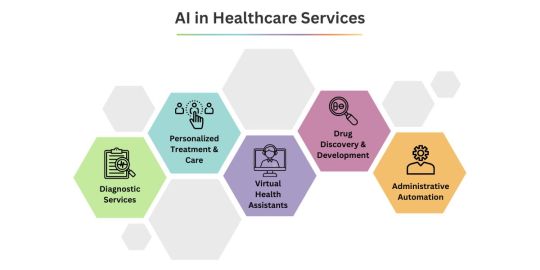
1.Diagnostic Services- AI and its Impact on Healthcare Services
AI-powered diagnostic services have significantly improved the accuracy and efficiency of medical imaging techniques such as X-rays, MRIs, and CT scans. By leveraging deep learning techniques algorithms, AI can analyze vast amounts of imaging data to detect diseases with unprecedented precision.
For instance, in the field of radiology, AI algorithms can identify early signs of cancer, fractures, and other abnormalities, leading to faster diagnoses and better patient outcomes. Furthermore, AI-driven pathology and histology tools are automating the analysis of tissue samples, enabling quicker and more accurate diagnostic insights.
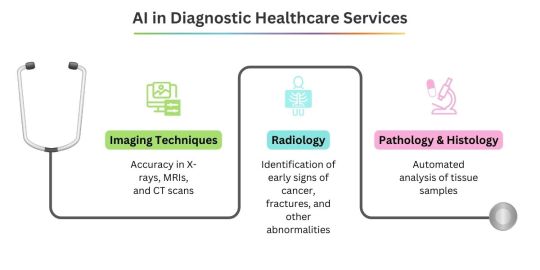
2. Personalized Treatment and Care
One of the most promising applications of AI in healthcare is the personalization of treatment and care plans based on individual patient data.
You may be wondering, how is it even possible? Well, AI algorithms can analyze patient demographics, medical history, genetic information, and lifestyle factors to tailor treatment regimens that are most effective for each patient.
The result? This personalized approach not only improves treatment outcomes but also reduces the risk of adverse reactions and unnecessary interventions. So, flowing with the stream of this systematic treatment and care, the role of AI in the healthcare sector is brighter and better.
In fact, healthcare providers are increasingly adopting AI-driven decision support systems to assist in treatment planning, medication management, and disease management, leading to more efficient and patient-centered care.
3.Virtual Health Assistants
As the world shrinks and processes get easier, it’s tough to oppose the fact that some AI technologies in healthcare are set to replace humans to a large extent.
One such point is how AI-powered virtual health assistants are revolutionizing the way patients access healthcare services and interact with healthcare providers.
How do they do it? These virtual assistants leverage natural language processing and machine learning algorithms to understand patient inquiries, provide medical advice, schedule appointments, and even assist with medication management. By offering convenient access to healthcare information and services, virtual health assistants improve patient engagement, enhance healthcare outcomes, and reduce the burden on healthcare facilities.
Additionally, virtual assistants play a crucial role in expanding access to healthcare services, particularly in rural or underserved areas where access to traditional healthcare facilities may be limited.
So as mind-boggling as it may sound, the reality is that AI applications in healthcare are going to be more reliable in the years to come if done and used right.
4.Drug Discovery and Development
AI has emerged as a powerful tool in drug discovery and development, significantly accelerating the process of bringing new therapies to market. By analyzing vast amounts of biomedical data, AI algorithms can identify potential drug targets, predict drug efficacy and safety profiles, and optimize drug candidates for clinical trials.
Pharmaceutical companies are increasingly leveraging AI-driven approaches to streamline drug discovery pipelines, reduce development costs, and improve the success rate of clinical trials.
Furthermore, AI enables the development of personalized medicine approaches by identifying patient subpopulations that are most likely to benefit from specific treatments, leading to more targeted and effective therapies.
5.Administrative Automation
In addition to clinical applications, AI is also transforming administrative tasks within the healthcare sector, such as billing, scheduling, and medical record documentation.
AI-driven administrative solutions automate repetitive tasks, streamline workflows, and reduce the likelihood of errors, thereby improving efficiency and reducing the administrative burden on healthcare professionals.
By freeing up time and resources, AI allows healthcare providers to focus more on patient care, ultimately enhancing the quality and delivery of healthcare services.
Ethical and Regulatory Considerations of AI in the Healthcare Industry
Despite the tremendous potential of AI in healthcare, it also raises important ethical and regulatory considerations that must be addressed.
These include concerns related to data privacy, algorithm bias, and the potential displacement of healthcare workers. It is essential to establish robust regulatory frameworks and industry standards to ensure the responsible and ethical use of AI technologies in healthcare.
Additionally, healthcare organizations must prioritize transparency, accountability, and fairness in the development and deployment of AI-driven solutions to build trust with patients and stakeholders.
Future Trends and Opportunities
Looking ahead, the future of AI in healthcare holds immense promise, with emerging trends such as the integration of genomics data, wearable devices, and real-time health monitoring poised to revolutionize healthcare delivery.
AI-powered technologies will continue to play a central role in driving innovation, improving patient outcomes, and advancing the practice of medicine. By embracing these opportunities and fostering collaboration between stakeholders, we can harness the full potential of AI to address healthcare challenges and improve the quality and accessibility of healthcare services for all.
Final Note
In conclusion, the role of AI in the healthcare sector is transformative, offering unprecedented opportunities to improve patient care, enhance healthcare outcomes, and optimize healthcare delivery.
From diagnostic services and personalized treatment to administrative automation and virtual health assistants, AI-powered technologies are reshaping every aspect of healthcare.
However, to realize the full potential of AI in healthcare, it is crucial to address ethical and regulatory considerations, prioritize transparency and accountability, and foster collaboration across the healthcare ecosystem. By doing so, we can unlock the transformative power of AI to build a healthier and more equitable future for all.
Looking to discover the magic of AI in healthcare and beyond? Reach out to us and our team of experienced AI enthusiasts at AIT Global would be pleased to help you integrate the wonders of AI in the operations of your venture!
0 notes
Text
When Biotech Meets AI: What's Next?
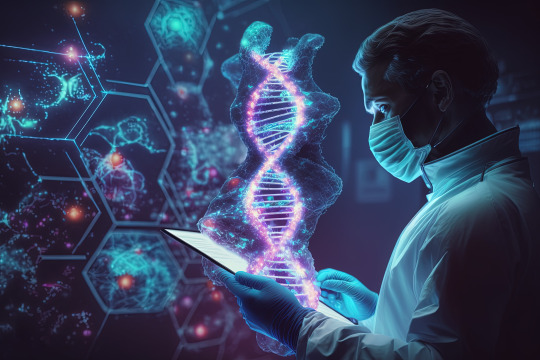
The intersection of biotechnology and artificial intelligence (AI) is creating a new paradigm in scientific research and innovation. This convergence is driving significant advancements across various sectors, from healthcare and agriculture to environmental management and biosecurity. This article explores the future of biotechnology as it integrates with AI, examining key advancements, potential applications, and the implications of these technologies. We'll delve into areas such as AI-driven drug discovery, personalized medicine, biomanufacturing, agricultural biotechnology, environmental biotechnology, biosecurity, and future trends. By understanding these developments, we can appreciate how AI is revolutionizing the biotech industry and anticipate what lies ahead.
AI-Driven Drug Discovery
AI is transforming drug discovery by making the process faster, cheaper, and more efficient. Traditionally, drug discovery involves years of research and billions of dollars. AI accelerates this by analyzing vast datasets to identify potential drug candidates and predict their efficacy. Companies like Recursion Pharmaceuticals and Insilico Medicine are using AI to streamline various stages of drug discovery, from initial screening to clinical trials. Recursion's AI-powered platform, Recursion OS, conducts millions of biological and chemical experiments in silico, filtering out ineffective compounds before they reach the lab. This approach reduces costs and speeds up the development of new drugs, exemplifying how AI is revolutionizing pharmaceutical research.
Personalized Medicine and Genomics
AI's role in genomics is transformative, enabling the analysis of complex genetic data to advance personalized medicine. Genomics involves studying an organism's complete DNA set to identify genetic variations associated with diseases. AI algorithms process this data to predict patient responses to treatments and tailor medical interventions to individual genetic profiles. For example, AI can identify mutations causing cancer, leading to the development of targeted therapies more effective for specific patient groups. Moreover, AI-driven tools can predict disease risks, allowing for early interventions and personalized treatment plans. This integration of AI and genomics is paving the way for more precise and effective healthcare.
Biomanufacturing and AI Optimization
Biomanufacturing, which involves producing biological products like vaccines and antibodies, is also being transformed by AI. AI enhances biomanufacturing by optimizing production workflows, predicting yield outcomes, and ensuring quality control. Machine learning models can identify the most efficient conditions for growing biological cultures, increasing productivity and reducing waste. Additionally, AI-driven predictive maintenance minimizes downtime by identifying potential equipment failures before they occur. This integration of AI in biomanufacturing not only improves efficiency but also ensures higher quality and consistency of biological products. AI's ability to analyze and optimize complex bioprocesses is revolutionizing the biomanufacturing industry, leading to more efficient and cost-effective production methods.
Agricultural Biotechnology
AI is playing a significant role in agricultural biotechnology by developing genetically modified crops resilient to environmental stresses, pests, and diseases. AI-driven tools analyze large datasets to identify the best genetic traits for crop improvement, helping design crops that withstand extreme weather, have higher nutritional value, and require fewer resources. AI algorithms can also analyze soil health, weather patterns, and crop performance to optimize planting schedules and irrigation practices, boosting crop yields and promoting sustainable agriculture. Additionally, AI monitors crop health in real-time using drone imagery and sensors, allowing for early detection of diseases and pests. This integration of AI in agriculture addresses food security challenges and promotes sustainable farming practices.
Environmental Biotechnology
AI aids environmental biotechnology by enhancing the detection and remediation of pollutants. Environmental biotechnology uses biological processes to address pollution and waste management. AI systems analyze data from sensors and satellite imagery to monitor pollution levels and identify contamination sources. AI-driven models predict the spread of pollutants and assess the effectiveness of bioremediation strategies, optimizing the use of microorganisms to break down hazardous substances. This approach improves the efficiency of cleanup efforts and reduces environmental impact. AI also develops predictive models for environmental changes, enabling proactive measures to mitigate adverse effects. The integration of AI in environmental biotechnology transforms how we manage and protect natural resources, leading to more sustainable practices.
Biosecurity and AI
AI's integration in biotechnology also raises important biosecurity considerations. AI helps detect and respond to biological threats, such as emerging pathogens or bioterrorism agents, by analyzing health data patterns and predicting outbreaks. Advanced AI algorithms identify unusual disease patterns, providing early warnings of potential biosecurity threats and allowing for timely interventions. AI supports developing rapid diagnostic tools and vaccines, enhancing our ability to respond to public health emergencies. However, using AI in biosecurity necessitates stringent regulatory measures to prevent the misuse of biotechnology for harmful purposes. Balancing the benefits of AI in biosecurity with ethical and safety concerns ensures these technologies protect public health responsibly.
The Future of AI in Biotechnology
The future of AI in biotechnology promises further advancements and innovations. As AI technology evolves, its applications in biotechnology are expected to expand, leading to more sophisticated and precise tools for research and development. The synergy between AI and emerging technologies like CRISPR and synthetic biology will open new avenues for scientific exploration and therapeutic innovation. AI's ability to process and analyze vast amounts of data will continue to drive breakthroughs in drug discovery, genomics, biomanufacturing, agricultural biotechnology, and environmental biotechnology. Ongoing improvements in AI algorithms, data processing capabilities, and computational power will enhance our ability to tackle complex biological challenges and develop novel solutions for healthcare, agriculture, and environmental management. The future of AI in biotechnology is bright, with the potential to revolutionize the field and improve the quality of life globally.
In Conclusion
AI is undeniably transforming biotechnology, driving significant advancements across various sectors. While some aspects of AI's impact on biotech can be seen as revolutionary, fundamentally altering how we approach drug discovery, genomics, and biomanufacturing, other aspects represent an evolutionary progression, building on existing technologies and enhancing their capabilities. The integration of AI in biotechnology holds immense potential for improving human health, food security, and environmental sustainability. As we continue to explore and harness the power of AI, addressing the ethical and regulatory challenges associated with its use is crucial to ensure that these advancements benefit society. This involves implementing robust frameworks for data privacy and security, developing transparent and interpretable AI models, and fostering collaboration between scientists, policymakers, and industry leaders. Furthermore, continued investment in AI research and development will be essential to unlocking its full potential in biotechnology. By embracing these advancements responsibly, we can look forward to a future where AI-driven innovations in biotechnology lead to unprecedented improvements in healthcare, agriculture, and environmental management.
0 notes
Text
Innovating Healthcare: The Power of Applications and Technologies
The healthcare landscape is undergoing a dramatic transformation, driven by the rapid advancement of applications and technologies. This evolution is not just a trend but a profound shift that promises to enhance patient care, streamline operations, and create more efficient, effective healthcare systems. From artificial intelligence (AI) to telemedicine, the integration of technology in healthcare is revolutionizing the way we diagnose, treat, and manage health conditions. Let’s explore some of the most impactful innovations shaping the future of healthcare.
Telemedicine: Bridging the Gap
Telemedicine has emerged as a critical tool, especially highlighted during the COVID-19 pandemic. It allows patients to consult with healthcare providers remotely, reducing the need for physical visits and minimizing the risk of spreading infections. This technology is particularly beneficial for individuals in rural or underserved areas, offering them access to specialist care that might otherwise be unavailable.
The convenience of telemedicine cannot be overstated. Patients can schedule appointments, receive prescriptions, and even get follow-up care without leaving their homes. This ease of access not only enhances patient satisfaction but also improves health outcomes by ensuring timely medical intervention.
Artificial Intelligence: Enhancing Diagnostics and Treatment
Artificial intelligence is revolutionizing healthcare by providing powerful tools for diagnostics and treatment. AI algorithms can analyze vast amounts of medical data, identifying patterns that might be invisible to the human eye. This capability is being used to develop predictive models for diseases, enabling early detection and more personalized treatment plans.
For instance, AI-powered imaging tools can detect anomalies in medical scans with remarkable accuracy, assisting radiologists in diagnosing conditions like cancer at an early stage. Additionally, AI is being used to predict patient outcomes and tailor treatments to individual genetic profiles, ushering in an era of precision medicine.
Electronic Health Records (EHRs): Streamlining Information Flow
Electronic Health Records (EHRs) have become the backbone of modern healthcare systems, replacing paper records with digital ones. EHRs facilitate the seamless sharing of patient information among healthcare providers, ensuring that all members of a patient's care team have access to the same data. This integration improves coordination, reduces the risk of errors, and enhances the overall quality of care.
Important Information:
Conference Name: 15th American Healthcare, Hospital Management, Nursing, And Patient Safety Summit
Short Name: # 15AHNPSUCG2025
Dates: May 14-16,2025
Venue: San Francisco, United States & Virtual
Email: [email protected]
Visit: https://health.universeconferences.com/
Call for Papers: https://health.universeconferences.com/call-for-paper/Register here: https://health.universeconferences.com/registration/Call/WhatsApp Us: +442033222718
Wearable Technology: Empowering Patients
Wearable technology is another game-changer in healthcare. Devices like fitness trackers, smartwatches, and even smart clothing can monitor a wide range of health metrics, including heart rate, physical activity, sleep patterns, and more. This real-time data collection allows for continuous health monitoring and early detection of potential issues.
Wearables also encourage a proactive approach to health management. By providing users with instant feedback on their health behaviors, these devices promote healthier lifestyle choices and increased physical activity. For patients with chronic conditions, wearables can track vital signs and alert healthcare providers to any concerning changes, enabling prompt intervention.
Blockchain: Securing Health Data
Blockchain technology, best known for its use in cryptocurrencies, is finding innovative applications in healthcare, particularly in securing health data. The decentralized and immutable nature of blockchain ensures that health records are protected from tampering and unauthorized access. This security is crucial in an era where data breaches are becoming increasingly common and costly.
Robotics: Revolutionizing Surgery and Rehabilitation
Robotics is making significant strides in the fields of surgery and rehabilitation. Robotic surgical systems provide surgeons with enhanced precision, flexibility, and control during procedures, leading to improved patient outcomes and faster recovery times. Minimally invasive robotic surgeries reduce the risk of complications and shorten hospital stays, benefiting both patients and healthcare providers.
In rehabilitation, robotic devices assist patients in regaining mobility and strength. Exoskeletons, for example, support patients with spinal cord injuries or stroke survivors, helping them to walk and perform daily activities. These advancements in robotics are transforming the recovery process, offering hope and improved quality of life to many patients.
Conclusion
The integration of applications and technologies in healthcare is not just enhancing the way we deliver medical services but also redefining the patient experience. From telemedicine and AI to wearables and blockchain, these innovations are creating a more connected, efficient, and patient-centric healthcare system. As technology continues to evolve, its potential to improve health outcomes and streamline care processes is boundless. The future of healthcare is here, and it is brighter and more promising than ever before.
#PublicHealth #ClimateAction #HealthyPlanet #PollutionControl #GlobalHealth #
#patientsafety #publichealth #nursing #healthcare #Doctors #healthcareconference
#PublicHealth#ClimateAction#HealthyPlanet#PollutionControl#GlobalHealth#patientsafety#publichealth#nursing#healthcare#Doctors#healthcareconference
0 notes
Text
Revolutionizing Healthcare: The Role of Artificial Intelligence in Biomedical Service Delivery
Artificial Intelligence (AI) is rapidly transforming various industries, and healthcare is at the forefront of this revolution. By enhancing efficiency, accuracy, and patient outcomes, AI is poised to redefine biomedical service delivery. Here’s a brief look at how AI is making waves in healthcare, the benefits it offers, the challenges it faces, and its future prospects.
Key Applications of AI in Healthcare
Diagnostic Imaging
AI algorithms, particularly those using deep learning, can analyse medical images like X-rays, MRIs, and CT scans with high precision, often surpassing human radiologists. This early detection capability is crucial for conditions such as cancer and fractures.

Predictive Analytics
AI-driven predictive analytics can forecast disease outbreaks, patient admissions, and individual health risks by analysing data from electronic health records (EHRs) and wearable devices. This proactive approach is vital for preventive healthcare and efficient resource management.
Personalized Medicine
AI enables the development of personalized medicine by analysing genetic, environmental, and lifestyle data. This is especially beneficial in oncology, where treatments can be tailored to the genetic profiles of patients and tumours.

Virtual Health Assistants
AI-powered virtual health assistants enhance patient engagement by providing medical advice, scheduling appointments, and managing medication adherence through natural language processing (NLP). This makes healthcare more accessible and convenient.
Drug Discovery
AI accelerates drug discovery by predicting interactions between compounds and biological targets. Machine learning models can assess chemical structures for efficacy and potential side effects, reducing the time and cost of developing new drugs.
Benefits of AI in Healthcare
Improved Accuracy and Efficiency: AI processes and analyses data faster and more accurately than humans, leading to quicker diagnoses and more effective treatments.
Cost Reduction: AI streamlines operations and optimizes resource allocation, lowering healthcare costs.
Enhanced Patient Care: AI provides valuable insights for more informed decision-making and personalized care, improving health outcomes and patient satisfaction.
Increased Accessibility: AI technologies like telemedicine and virtual assistants make healthcare more accessible, especially in remote or underserved areas.
Challenges and Considerations
Data Privacy and Security: Handling sensitive patient information raises concerns about data privacy and security. Robust protection measures are essential.
Ethical Issues: AI in healthcare brings ethical challenges, such as algorithmic bias and the impact of AI-driven decisions on patient autonomy.
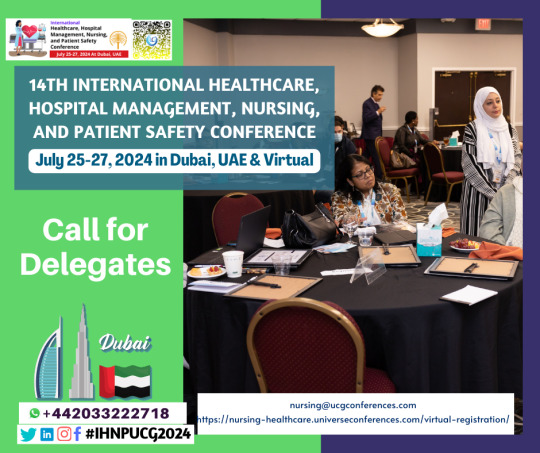
Integration with Existing Systems: Ensuring standardization and interoperability is crucial for seamless AI integration into existing healthcare infrastructure.
Regulatory Compliance: Navigating the complex regulatory landscape can be time-consuming, affecting the rapid adoption of AI innovations.
The Future of AI in Healthcare
The future of AI in biomedical service delivery looks promising, with advancements expected in several areas:
Advanced Robotics: AI-driven robots will enhance surgery, rehabilitation, and patient care with unparalleled precision.
Genomics: AI will propel genetic analysis, deepening our understanding of complex genetic diseases.
Mental Health: AI will offer new tools for diagnosing and treating mental health conditions, promoting early detection and personalized care.
Global Health: AI has the potential to provide scalable solutions for disease detection and treatment in resource-limited settings, addressing global health challenges.
Conclusion
AI is revolutionizing healthcare by improving accuracy, efficiency, and patient care. Despite challenges in data privacy, ethics, integration, and regulation, the continued advancement of AI holds the promise of transforming healthcare into a more personalized, accessible, and effective system for all.

0 notes
Text
The Role of AI and Machine Learning in Custom Healthcare Apps
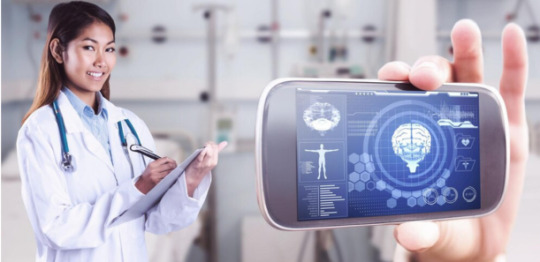
The intersection of healthcare and technology is a fascinating realm. It's where innovation meets compassion, and science meets empathy.
In this space, Artificial Intelligence (AI) and Machine Learning (ML) are making significant strides. They are transforming the way we approach healthcare, particularly through custom healthcare apps.
Custom healthcare apps are not just digital tools. They are personalized health companions, designed to cater to individual health needs. AI and ML are the driving forces behind these apps, enabling them to learn, adapt, and provide personalized care.
AI is revolutionizing the healthcare mobile app development industry. It's enabling smart health monitoring, predictive analytics, and personalized healthcare. It's not just about making healthcare more efficient; it's about making it more human.
Machine Learning, a subset of AI, is playing a crucial role too. It's helping analyze vast amounts of health data, uncovering patterns and insights that can improve patient care.
This article explores the role of AI and ML in custom healthcare apps. It delves into how these technologies are transforming healthcare, the opportunities they present, and the challenges they pose.
Join us as we navigate the exciting landscape of AI and ML in healthcare. Let's explore how these technologies are helping us achieve the dream of personalized healthcare.
Understanding Custom Healthcare Apps
Custom healthcare apps are digital platforms designed to cater to specific health needs. They are not one-size-fits-all solutions. Instead, they are tailored to individual users, providing personalized care and support.
These apps can range from fitness trackers and nutrition guides to medication reminders and telemedicine platforms. They can help manage chronic conditions, support mental health, and even assist in emergency situations. The goal is to make healthcare more accessible, efficient, and personalized.
AI and ML are integral to these apps. They enable the apps to learn from user data, adapt to individual health patterns, and provide personalized recommendations. This is the power of custom healthcare apps, and it's transforming the way we approach healthcare.
The Emergence of AI in Healthcare
Artificial Intelligence (AI) has emerged as a game-changer in the healthcare sector. It's not just about futuristic robots performing surgeries. AI is about data, algorithms, and predictive analytics. It's about making sense of vast amounts of health data to improve patient outcomes.
AI can analyze patient records, medical images, and genetic data faster and more accurately than humans. It can predict health risks, suggest treatments, and even assist in real-time during surgeries. This is transforming healthcare, making it more proactive and personalized.
Machine Learning (ML), a subset of AI, is particularly impactful. It enables systems to learn from data, identify patterns, and make decisions with minimal human intervention. In healthcare, this means predicting diseases, personalizing treatments, and improving patient care. The emergence of AI and ML in healthcare is truly a revolution in the making.
Machine Learning: A Game Changer in Health Data Analysis
Machine Learning (ML) is a powerful tool in health data analysis. It can process vast amounts of data, identify patterns, and make predictions. This is invaluable in healthcare, where data is abundant but often underutilized.
ML algorithms can analyze electronic health records, medical images, and genetic data. They can predict disease risks, suggest personalized treatments, and improve patient care. This is transforming healthcare from a reactive to a proactive model.
The potential of ML in healthcare is immense. It can help us understand diseases better, develop new treatments, and improve patient outcomes. The use of ML in health data analysis is not just a trend, it's a game-changer.
AI Transforming the Healthcare Mobile App Development Industry
Artificial Intelligence (AI) is revolutionizing the healthcare mobile app development industry. It's enabling the creation of custom healthcare apps that are smarter, more efficient, and more personalized.
These apps leverage AI to provide personalized health recommendations, monitor patient health in real-time, and even predict potential health issues. They're transforming the way we manage our health, making healthcare more accessible and personalized.
Here are some ways AI is transforming the healthcare mobile app development industry:
Personalized health recommendations: AI algorithms analyze user data to provide personalized health advice.
Real-time health monitoring: AI-powered apps can monitor user health in real-time, alerting them to potential health issues.
Predictive health analytics: AI can predict potential health issues based on user data, enabling preventative care.
The impact of AI on the healthcare mobile app development industry is profound. It's enabling the creation of custom healthcare apps that are not just tools, but intelligent health advisors.
Smart Health Monitoring: AI's Role in Personalized Healthcare
AI is playing a pivotal role in personalized healthcare through smart health monitoring. It's enabling the development of custom healthcare apps that can monitor a user's health in real-time. These apps can track vital signs, physical activity, sleep patterns, and more.
AI algorithms analyze this data to provide personalized health insights. They can identify patterns, detect anomalies, and even predict potential health issues. This allows users to take proactive steps towards their health, rather than reactive ones.
Moreover, these AI-powered apps can also provide personalized health recommendations. They can suggest diet changes, exercise routines, sleep schedules, and more based on the user's health data. This level of personalization is transforming the way we manage our health.
In conclusion, AI is revolutionizing personalized healthcare through smart health monitoring. It's enabling the development of custom healthcare apps that can monitor, analyze, and provide insights into a user's health in real-time.
Use Cases of AI and Machine Learning in Healthcare
AI and Machine Learning are not just buzzwords in the healthcare industry. They are driving significant advancements and improvements in various areas. From diagnostics to treatment plans, these technologies are transforming the way healthcare is delivered.
Here are some notable use cases of AI and Machine Learning in healthcare:
Predictive Analytics: Machine Learning algorithms can analyze vast amounts of health data to predict potential health issues. This allows for early intervention and can significantly improve patient outcomes.
Medical Imaging: AI can analyze medical images, such as X-rays and MRIs, to detect anomalies. This can aid in early diagnosis and treatment.
Personalized Medicine: AI can analyze a patient's genetic information to recommend personalized treatment plans. This can improve the effectiveness of treatments and reduce side effects.
Drug Discovery: AI can analyze the chemical structure of drugs and predict their effects. This can speed up the drug discovery process and bring new treatments to market faster.
These use cases highlight the transformative potential of AI and Machine Learning in healthcare. They are enabling more accurate diagnoses, personalized treatments, and improved patient outcomes.
Benefits of AI in Healthcare App Development
The integration of AI in healthcare app development is not just a trend. It's a significant shift that's enhancing the capabilities of healthcare apps and delivering numerous benefits.
One of the key benefits is the ability to provide personalized care. AI algorithms can analyze a user's health data to provide personalized health insights and recommendations. This can lead to improved health outcomes and a more engaging user experience.
AI can also automate routine tasks, such as scheduling appointments or sending reminders for medication. This can save time for both healthcare providers and patients, and improve the efficiency of healthcare delivery.
Moreover, AI can enhance decision-making in healthcare. By analyzing large amounts of data, AI can provide valuable insights that can inform clinical decisions. This can lead to more accurate diagnoses and more effective treatments.
In conclusion, the benefits of AI in healthcare app development are significant. From personalization to automation to enhanced decision-making, AI is transforming the way healthcare apps are developed and used.
Overcoming Challenges: AI in the Realm of Personalized Healthcare

Despite the numerous benefits, the integration of AI in healthcare apps is not without challenges. One of the main hurdles is the issue of data privacy and security.
Healthcare apps handle sensitive patient data, and the use of AI algorithms for data analysis raises concerns about data privacy. Developers need to ensure that they comply with data protection regulations and implement robust security measures to protect patient data.
Another challenge is the need for high-quality, diverse datasets for AI algorithms to learn from. The effectiveness of AI in providing personalized healthcare largely depends on the quality and diversity of the data it's trained on. Therefore, developers need to ensure they have access to such datasets, and that the data is representative of the diverse patient populations that the apps serve.
Ethical Considerations and Regulatory Compliance in AI Healthcare Apps
The use of AI in healthcare apps also raises ethical considerations. For instance, AI algorithms can make decisions that impact patient care, and there are concerns about the transparency and accountability of these decisions.
Developers need to ensure that their AI algorithms are transparent and explainable, and that there are mechanisms in place to hold them accountable for their decisions. This is particularly important in healthcare, where decisions can have life-or-death consequences.
In addition to ethical considerations, developers also need to navigate a complex regulatory landscape. AI healthcare apps are subject to various regulations, including those related to medical devices and data protection. Compliance with these regulations is crucial to ensure the safety and efficacy of the apps, and to maintain trust with users.
The Future of AI and Machine Learning in Healthcare: What Lies Ahead?
The future of AI and Machine Learning in healthcare looks promising. As technology continues to evolve, we can expect to see even more sophisticated AI and ML applications in healthcare.
One area where AI and ML are expected to make significant strides is in predictive analytics. By analyzing large datasets, AI and ML can help predict health events, such as disease outbreaks or patient deterioration, before they happen. This could revolutionize healthcare by enabling proactive, rather than reactive, care.
AI and ML are also expected to play a key role in the development of personalized medicine. By analyzing individual patient data, AI and ML can help tailor treatments to individual patients, improving outcomes and reducing healthcare costs.
However, the future of AI and ML in healthcare is not without challenges. Issues such as data privacy, algorithmic bias, and regulatory compliance will need to be addressed. But with the right approach, AI and ML have the potential to transform healthcare for the better.
Conclusion: The Integral Role of AI and ML in Advancing Healthcare
In conclusion, AI and Machine Learning are playing an increasingly integral role in advancing healthcare. They are not just transforming the way healthcare apps are developed, but also how healthcare is delivered and managed.
From predictive analytics to personalized medicine, AI and ML are enabling more efficient, effective, and personalized care. They are helping to improve patient outcomes, reduce healthcare costs, and make healthcare more accessible to all.
However, as we move forward, it's crucial to address the challenges and ethical considerations associated with AI and ML in healthcare. By doing so, we can ensure that these technologies are used responsibly and to their full potential, ultimately improving the quality of care and the patient experience.
0 notes
Text
INNOVATIONS TRANSFORMING CANCER TREATMENT: A LOOK AT CUTTING-EDGE TECHNOLOGIES
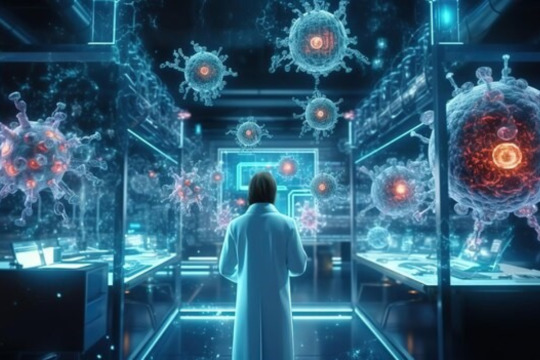
In the realm of cancer research, what once seemed like science fiction is now a tangible reality, all thanks to a myriad of technological advancements. These innovations are not just changing the way we perceive cancer treatment but are actively accelerating progress against this formidable disease. In this given blog Dr Ashish Gupta will help you understand some groundbreaking technologies that are reshaping the landscape of cancer care and ushering in a new era of hope and possibility.
Artificial Intelligence (AI)
Imagine having a digital twin- a virtual representation of yourself – crafted through sophisticated AI algorithms to help physicians tailor treatment plans with unparalleled precision. This futuristic concept is now within reach, thanks to the remarkable capabilities of artificial intelligence. By sifting through vast troves of data, AI can pinpoint patterns, aiding in cancer diagnosis, drug development, and personalized medicine. As per Dr Ashish Gupta, USA trained, American board-certified medical oncologist, Chief of Medical Oncology, Unique Hospital Cancer Centre, Dwarka India, whether it’s analyzing imaging data or predicting treatment outcomes, AI is poised to revolutionize every facet of cancer care, promising transformative advancements on the horizon.
Telehealth
In an age where connectivity reigns supreme, telehealth emerges as a beacon of hope, seamlessly bridging the gap between patients and cancer care providers. Especially crucial in the midst of a pandemic, telehealth has become instrumental in delivering cancer treatment and running clinical trials remotely. From remote health monitoring to video consultations, telehealth not only enhances accessibility but also ensures safety and convenience for patients and providers alike. However, the journey towards equitable telehealth access poses its own set of challenges, underscoring the ongoing need for research and innovation in this domain.
Cryo-Electron Microscopy (Cryo-EM)
Peer through the lens of cryo-electron microscopy, and you’ll behold a world of molecular intricacies previously unseen. With unprecedented resolution, Cryo-EM enables researchers to delve into the inner workings of molecules, unraveling the mysteries of cancer cell behavior and therapeutic interactions. Recent breakthroughs, such as visualizing drug interactions at the molecular level, exemplify the transformative potential of Cryo-EM in shaping future cancer treatments. As access to this cutting-edge technology expands, so too does our understanding of cancer biology, paving the way for targeted interventions and personalized therapies.
Infinium Assay
The secrets encoded within our genes, the Infinium Assay emerges as a powerful tool in deciphering the genetic underpinnings of cancer. By scrutinizing millions of genetic variations, this innovative assay sheds light on cancer risk, progression, and development. Initially met with skepticism, its journey from conception to widespread adoption showcases the tangible impact of taxpayer-funded innovation. From cancer research to population-wide genomic studies, the Infinium Assay holds immense promise in unraveling the genetic tapestry of cancer and beyond.
Robotic Surgery
Enter the realm of robotic surgery, where precision meets innovation to redefine the surgical landscape. With robotic arms wielding scalpel-like precision, complex cancer surgeries become minimally invasive affairs, offering patients faster recovery times and reduced postoperative discomfort. Beyond the allure of futuristic technology, robotic surgery epitomizes the marriage of precision and compassion, offering renewed hope to cancer patients worldwide.
Conclusion
As we stand at the precipice of a new era in cancer treatment, fueled by cutting-edge technologies, the future holds boundless promise and potential. From AI-driven personalized medicine to the precision of robotic surgery, each innovation represents a stepping stone towards a world where cancer is not just treatable but conquerable. By embracing and harnessing these transformative technologies, we embark on a journey towards a brighter, healthier tomorrow- one where cancer is no longer a formidable adversary but a conquerable challenge. If you are searching best cancer treatment, contact Dr Ashish Gupta, USA trained, American board-certified medical oncologist
#best oncologist in delhi ncr#best oncology doctor in delhi#cancer tratment in dwakra#unique cancer hospital#top oncologists in dwarka#cancer doctor in delhi#best doctor for breast cancer#USA Second Opinion
0 notes
Text
The Future of Healthcare: AI Diagnostics
With the promise of new technologies like artificial intelligence (AI), the future of healthcare looks brighter than ever. But don’t imagine physician holograms beaming in for exams, instead AI is poised to transform the ways we diagnose and treat patients. With its ability to rapidly process and analyze large amounts of patient data, the promise of delivering diagnostic accuracy that surpasses human capacity is a real possibility.
AI’s powerful predictive analytics capabilities can help identify patterns of disease in the early stages, which may be overlooked by physicians with less experience. This can reduce the need for costly interventions by identifying high-risk individuals and enabling early intervention.
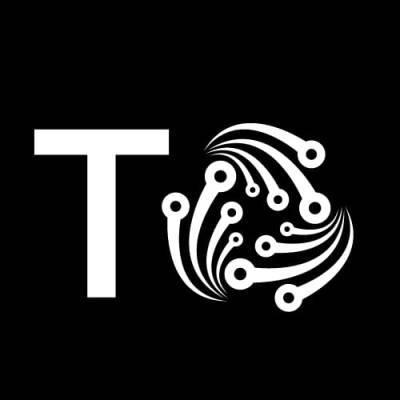
It can also provide a more accurate diagnosis than human experts, accelerating the diagnostic process. This is possible by combining medical imaging, genetic data, and other information to identify key factors that influence an individual’s response to treatment. Using this type of data, doctors can create customized treatment plans for each patient that account for unique biological and pharmacological characteristics, which enhances treatment efficacy and minimizes side effects.
As AI continues to technology news improve its accuracy, it will become a vital tool for many medical practitioners. But its use in the field of diagnostics will be carefully considered to mitigate risks and ensure privacy and security. To that end, it will only be utilized by certified healthcare professionals who can verify its findings and take responsibility for any errors.
It will also enable healthcare providers to streamline operations by automating repetitive tasks and optimizing resource allocation. For example, implementing an AI-based scheduling system can reduce wait times for patients and maximize utilization of staff and equipment, cutting costs. AI can also analyze and predict trends, helping to optimize inventory and forecast demand.
Personalized What is techogle? medicine can be achieved by using predictive AI systems to develop targeted therapies for each patient’s specific needs, minimizing the risk of adverse reactions and side effects. This is a huge step in the right direction for healthcare, as it recognizes that each patient is unique and requires a different approach to their care.
But it isn’t miraculous procedures or revolutionary new devices that boost Lin’s optimism the most, it’s the potential of AI to help alleviate the stressors on healthcare professionals that contribute to burnout and lead to staff exits. With the right tools and careful planning, AI could reduce the number of administrative tasks that physicians must deal with, reducing their workload and providing them more time to spend on more pressing matters such as a patient’s health and well-being.
1 note
·
View note
Text
The Role of Artificial Intelligence in Transforming Healthcare
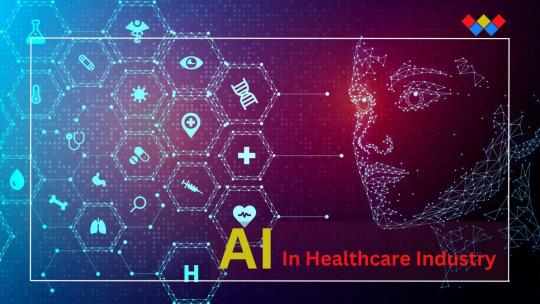
Introduction
Artificial Intelligence (AI) is revolutionizing various sectors, and healthcare is no exception. With its ability to analyze vast amounts of data, recognize patterns, and make predictions, AI holds immense potential to transform healthcare delivery, diagnosis, treatment, and patient outcomes. This article delves into the multifaceted role of AI in reshaping the landscape of healthcare.
Enhanced Diagnostics and Early Detection
One of the most significant contributions of AI in healthcare is in diagnostics and early detection of diseases. AI algorithms can analyze medical images, such as X-rays, MRIs, and CT scans, with remarkable accuracy and speed. For instance, deep learning algorithms have demonstrated capabilities comparable to or even surpassing human experts in detecting various conditions, including cancerous tumors and fractures. Moreover, AI-powered diagnostic tools can detect subtle anomalies that might escape human observation, enabling early intervention and improving patient outcomes.
Personalized Treatment Plans
AI facilitates the development of personalized treatment plans tailored to individual patients based on their unique characteristics, medical history, and genetic makeup. By analyzing vast datasets of patient records, clinical trials, and genomic information, AI algorithms can identify optimal treatment strategies with higher efficacy and fewer adverse effects. This approach, known as precision medicine, holds promise for improving treatment outcomes, minimizing healthcare costs, and reducing the burden of trial and error in drug prescriptions.
Predictive Analytics and Preventive Healthcare
Another crucial aspect of AI in healthcare is its ability to leverage predictive analytics for preventive care. By analyzing patient data and risk factors, AI algorithms can predict the likelihood of developing certain diseases or complications. This enables healthcare providers to intervene proactively, implementing preventive measures and lifestyle modifications to mitigate risks and improve patient health outcomes. Moreover, AI-powered predictive models can help identify high-risk individuals for targeted screening programs, leading to early detection and intervention, thereby reducing healthcare costs and improving population health.
Streamlined Administrative Processes
AI technologies are also streamlining administrative processes within healthcare organizations, reducing administrative burden, and enhancing operational efficiency. Natural Language Processing (NLP) algorithms, for instance, can automate medical coding, transcription, and documentation tasks, saving time for healthcare professionals and reducing errors. Additionally, AI-powered chatbots and virtual assistants are being employed for patient engagement, appointment scheduling, and providing basic medical advice, thereby improving access to healthcare services and enhancing patient satisfaction.
Drug Discovery and Development
AI is revolutionizing the drug discovery and development process, accelerating the identification of potential drug candidates and optimizing clinical trials. Machine learning algorithms can analyze large datasets of molecular structures, biological pathways, and clinical trial data to identify novel drug targets and predict the efficacy and safety of drug candidates. This enables pharmaceutical companies to expedite the drug development process, reduce costs, and bring new therapies to market more efficiently. Furthermore, AI-driven simulations and modeling techniques are facilitating the design of more precise and targeted therapeutics, leading to improved treatment outcomes and personalized medicine approaches.
Remote Patient Monitoring and Telemedicine
The proliferation of AI-powered wearable devices and remote monitoring technologies is transforming the delivery of healthcare services, particularly in remote or underserved areas. These devices can continuously collect and analyze patient data, such as vital signs, activity levels, and medication adherence, providing healthcare providers with real-time insights into patients' health status. Moreover, AI algorithms can detect deviations from normal patterns and alert healthcare providers to potential health risks, enabling timely interventions and preventing complications. Telemedicine platforms, supported by AI-driven diagnostic tools and virtual consultations, are also expanding access to healthcare services, enabling patients to receive medical advice and treatment remotely, thereby improving patient convenience and reducing healthcare disparities.
Ethical and Regulatory Considerations
While AI holds immense promise for transforming healthcare, it also raises ethical and regulatory challenges that need to be addressed. Issues such as data privacy, security, bias in algorithms, and the potential for job displacement require careful consideration and regulatory oversight. Moreover, there are concerns about the accountability and transparency of AI systems in healthcare, particularly regarding decision-making processes and patient safety. As AI technologies continue to evolve and become more integrated into healthcare systems, it is essential to establish robust ethical guidelines, regulatory frameworks, and standards to ensure responsible and equitable deployment.
Artificial Intelligence is revolutionizing healthcare delivery, diagnosis, treatment, and patient outcomes in myriad ways. From enhanced diagnostics and personalized treatment plans to predictive analytics and preventive healthcare, AI is reshaping the healthcare landscape, improving access to services, and driving innovation. However, realizing the full potential of AI in healthcare requires addressing ethical, regulatory, and implementation challenges, while ensuring patient safety, privacy, and equity. With continued research, collaboration, and investment, AI has the power to transform healthcare and usher in a new era of precision medicine and patient-centered care.
Read More: https://webrankmedia.wordpress.com/2024/04/12/the-role-of-artificial-intelligence-in-shaping-the-future-of-healthcare/
Follow Us: LinkedIn | Medium | Twitter
#AIinHealthcare#HealthcareInnovation#MedicalAI#ArtificialIntelligence#HealthTech#AIforHealthcare#MedTech#MachineLearningInMedicine#AIforMedicalResearch
0 notes
Text
The Impact of Artificial Intelligence on Healthcare: Transforming Patient Care and Medical Practice

Artificial intelligence (AI) is revolutionizing the healthcare industry, promising to enhance patient care, improve clinical outcomes, and streamline medical practices. From diagnostic algorithms and predictive analytics to personalized treatment plans and robotic surgeries, AI-powered innovations are reshaping every aspect of healthcare delivery. As the integration of AI technologies accelerates, the impact on patients, healthcare providers, and the broader healthcare ecosystem is becoming increasingly profound.
Here are some key aspects of the impact of artificial intelligence on healthcare:
Early Disease Detection and Diagnosis:
AI-driven diagnostic tools leverage machine learning algorithms to analyze medical images, genomic data, and clinical records, enabling early detection and accurate diagnosis of diseases. From detecting cancerous lesions on mammograms to identifying abnormalities on CT scans, AI algorithms can assist healthcare providers in making more timely and precise diagnoses, leading to improved patient outcomes and distance education in ksa mortality rates.
Personalized Treatment Planning:
AI algorithms analyze vast amounts of patient data, including medical history, genetic information, and treatment outcomes, to generate personalized treatment plans tailored to individual patients' needs. By incorporating patient-specific factors such as genetic predispositions, lifestyle habits, and treatment responses, AI-powered decision support systems help healthcare providers optimize treatment strategies and improve therapeutic outcomes while minimizing adverse effects and treatment complications.
Predictive Analytics and Preventive Care:
AI-based predictive analytics algorithms analyze patient data to identify individuals at high risk of developing certain medical conditions or experiencing adverse health outcomes. By analyzing patterns and trends in patient data, AI algorithms can predict the likelihood of future health events, such as hospital readmissions, medication non-adherence, or disease progression. This enables healthcare providers to intervene proactively with preventive measures and targeted interventions to mitigate risks and improve patient health outcomes.
Operational Efficiency and Resource Optimization:
AI technologies streamline administrative tasks, optimize healthcare operations, and enhance resource allocation within healthcare organizations. From automating appointment scheduling and medical billing to optimizing hospital workflows and managing inventory levels, AI-powered solutions help healthcare providers reduce administrative burdens, improve operational efficiency, and allocate resources more effectively, thereby enhancing the quality and accessibility of healthcare services.
Ethical and Regulatory Considerations:
As AI technologies become more integrated into healthcare delivery, ethical and regulatory considerations surrounding data privacy, patient consent, algorithm transparency, and algorithm bias become increasingly important. Ensuring the responsible development, deployment, and oversight of AI-powered healthcare solutions requires collaboration between healthcare providers, technology developers, policymakers, and regulatory agencies to establish ethical guidelines, standards, and safeguards that protect patient rights and ensure the ethical use of AI in healthcare.
In conclusion, the impact of artificial intelligence on healthcare is transformative, offering unprecedented opportunities to improve patient care, enhance clinical decision-making, and revolutionize medical practice. By harnessing the power of AI-driven innovations, healthcare providers can unlock new insights, optimize treatment outcomes, and empower patients to lead healthier, more fulfilling lives. As AI continues to advance, its role in healthcare will undoubtedly expand, ushering in a new era of precision medicine, personalized care, and healthcare innovation.
0 notes
Text
Harnessing the Power of AI: Embracing Technology in Healthcare
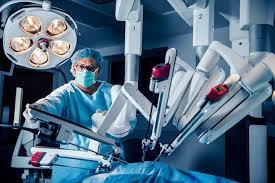
In today's rapidly advancing healthcare landscape, the integration of cutting-edge technologies is revolutionizing patient care and clinical practices. Among these technologies, Embracing Technology such as Artificial Intelligence (AI) is reshaping the way healthcare is delivered and experienced. In this blog post, we'll explore how healthcare organizations are harnessing the power of AI and other innovative technologies, including AI-powered Diagnostics, Personalized Medicine, Robotic-Assisted Surgery, Predictive Analytics, and Virtual Assistants & Chatbots, to enhance patient outcomes and improve operational efficiency.
AI-powered Diagnostics are transforming the field of medical diagnostics by leveraging machine learning algorithms to analyze complex datasets and identify patterns indicative of various diseases and conditions. AI-driven diagnostic tools can analyze medical images, laboratory results, and patient data with unparalleled accuracy and efficiency, enabling earlier detection and more precise diagnosis of diseases such as cancer, cardiovascular disorders, and neurological conditions.
Personalized Medicine is revolutionizing patient care by tailoring treatment plans to individual patients' genetic makeup, lifestyle factors, and disease characteristics. AI algorithms analyze vast amounts of patient data to identify optimal treatment strategies, predict treatment responses, and minimize adverse effects. By personalizing treatment approaches, healthcare providers can optimize therapeutic outcomes and improve patient satisfaction.
Robotic-Assisted Surgery is enhancing surgical precision and patient outcomes by combining the expertise of surgeons with the precision and dexterity of robotic systems. AI-powered surgical robots assist surgeons in performing complex procedures with greater accuracy, reduced invasiveness, and shorter recovery times. From minimally invasive surgeries to delicate procedures such as neurosurgery and cardiac surgery, robotic-assisted surgery is transforming the surgical landscape and expanding treatment options for patients.
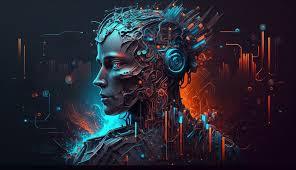
Predictive Analytics harnesses the power of AI and big data to forecast patient outcomes, identify high-risk populations, and optimize resource allocation. By analyzing vast amounts of patient data, including electronic health records, medical imaging studies, and genomic information, predictive analytics models can anticipate disease progression, predict hospital readmissions, and guide preventive interventions. Healthcare organizations use predictive analytics to improve clinical decision-making, optimize care delivery, and reduce healthcare costs.
Virtual Assistants & Chatbots are enhancing patient engagement and access to care by providing on-demand support, information, and assistance. AI-powered virtual assistants and chatbots interact with patients through natural language processing technologies, answering questions, scheduling appointments, and providing personalized health recommendations. By offering convenient and accessible support, virtual assistants and chatbots empower patients to take an active role in managing their health and well-being.
In conclusion, Embracing Technology such as AI is transforming healthcare delivery by enhancing diagnostic accuracy, enabling personalized treatment approaches, improving surgical precision, facilitating predictive analytics, and enhancing patient engagement. By leveraging the power of AI-driven technologies such as AI-powered Diagnostics, Personalized Medicine, Robotic-Assisted Surgery, Predictive Analytics, and Virtual Assistants & Chatbots, healthcare organizations can deliver more efficient, effective, and patient-centered care in the digital age.
#AI-powered Diagnostics#Personalized Medicine#Robotic-Assisted Surgery#Predictive Analytics#Virtual Assistants & Chatbots
0 notes
Text
Tech Horizons: Exploring Cutting-Edge Innovations Shaping Tomorrow's World
In today's fast-paced world, technological advancements continue to reshape our lives at an unprecedented rate. From artificial intelligence to biotechnology, the realm of innovation knows no bounds. These advancements not only enhance efficiency and convenience but also pave the way for groundbreaking discoveries that were once deemed impossible. Let's delve into the latest developments that are revolutionizing the landscape of technology.
AI and Machine Learning: The Power of Intelligent Automation
Artificial Intelligence (AI) and Machine Learning (ML) have emerged as the driving forces behind transformative technological progress. With algorithms that can learn and adapt, AI is enabling machines to perform tasks that previously required human intelligence. From predictive analytics to natural language processing, AI is being integrated into various sectors, including healthcare, finance, and manufacturing.
In healthcare, AI-powered diagnostic tools are revolutionizing patient care by providing more accurate and timely diagnoses. Machine learning algorithms analyze vast amounts of medical data to identify patterns and anomalies, assisting healthcare professionals in making informed decisions. Moreover, AI-driven robotics are revolutionizing surgery, enhancing precision, and reducing recovery times.
In finance, AI algorithms are revolutionizing the way transactions are conducted and risks are managed. High-frequency trading algorithms analyze market data in real time, making split-second decisions to optimize investment strategies. Additionally, AI-powered chatbots are enhancing customer service by providing personalized assistance and resolving queries efficiently.
Blockchain Technology: Redefining Security and Transparency
Blockchain technology, initially popularized by cryptocurrencies like Bitcoin, is now being leveraged across various industries for its unparalleled security and transparency. By creating decentralized and immutable ledgers, blockchain technology eliminates the need for intermediaries, thereby reducing costs and minimizing the risk of fraud.
In supply chain management, blockchain enables end-to-end traceability, allowing stakeholders to track the journey of products from manufacturer to consumer accurately. This not only enhances transparency but also facilitates efficient inventory management and ensures the authenticity of goods.
Moreover, blockchain is transforming the realm of digital identity management by providing a secure and tamper-proof method of storing and verifying personal information. Through decentralized identity platforms, individuals can maintain control over their digital identities, mitigating the risks associated with centralized data storage.
Biotechnology: Unlocking the Secrets of Life
Advancements in biotechnology are unlocking the secrets of life and revolutionizing fields such as healthcare, agriculture, and environmental conservation. From gene editing technologies like CRISPR to synthetic biology, scientists are harnessing the power of biology to address some of humanity's most pressing challenges.
In healthcare, biotechnology is driving innovations in personalized medicine, allowing for tailored treatments based on an individual's genetic makeup. CRISPR-based gene editing has the potential to cure genetic diseases by precisely modifying faulty genes, offering hope to millions of patients worldwide.
In agriculture, biotechnology is enhancing crop yields and resilience through genetically modified organisms (GMOs) and gene editing techniques. By engineering crops to withstand environmental stresses and pests, biotechnology has the potential to address food security issues and reduce the environmental impact of agriculture.
Furthermore, biotechnology is playing a crucial role in environmental conservation by offering sustainable alternatives to traditional industries. From biofuels to biodegradable materials, biotechnology is paving the way for a more eco-friendly future.
The Future of Technology: Embracing Innovation
As we stand on the brink of a new era of technological advancement, it is essential to embrace innovation and harness its transformative potential responsibly. From AI and machine learning to blockchain and biotechnology, the latest advancements in technology hold the key to addressing some of the most pressing challenges facing humanity.
However, with great power comes great responsibility. It is imperative to ensure that technological advancements are deployed ethically and inclusively, considering their societal impacts and implications. By fostering collaboration and dialogue between stakeholders, we can harness the power of technology to build a brighter and more sustainable future for all.
The latest technological advancements are revolutionizing every aspect of our lives, from healthcare and finance to agriculture and environmental conservation. By embracing innovation and leveraging these advancements responsibly, we can unlock new opportunities and address the challenges of tomorrow. The future is bright, and it's up to us to shape it for the better.
0 notes
Text
AI in Medical Diagnostics Growth, Overview with Detailed Analysis | (2023-2033)
AI in medical diagnostics refers to the utilization of artificial intelligence (AI) techniques, such as machine learning and deep learning, to assist healthcare professionals in diagnosing diseases and conditions.
The global digital diagnostics market is projected to reach $8,319.2 million by 2033 from $1,431.7 million in 2023, growing at a CAGR of 19.24% during the forecast period 2023-2033
AI in Medical Diagnostics Overview
AI in medical diagnostics aims to enhance diagnostic accuracy, efficiency, and ultimately, patient outcomes. By analyzing diverse datasets including medical images (such as X-rays, MRIs, CT scans), pathology slides, genetic information, patient records, and clinical notes, AI algorithms can identify patterns, correlations, and anomalies that may evade human perception. This ability enables AI systems to detect subtle signs of disease, predict disease progression, stratify patient risk, and recommend personalized treatment plans tailored to individual patients.
Visit our Digital Diagnostics report click here !
The AI in the digital diagnostics market by application, including radiology, pathology, cardiology, oncology, neurology, and others. Each segment is analyzed in terms of market size, growth potential, and technological advancements driving adoption.
Uses of AI in Medical Diagnostics
Medical Imaging Analysis
Genomics and Personalized Medicine
Early Disease Detection
Clinical Trials and Research
Download the sample page! Click Here
Market Segmentation
Based on application
Based on End Users
Based on Product
Based on Region
Key Players are as follows
• GE Healthcare
• Siemens Healthineers
• Medtronic plc
• Nano-X Imaging Ltd.
• Koninklijke Philips NV.
• Digital Diagnostics Inc.
• Riverain Technologies
Visit our Digital Health vertical page and have a look and better understanding for the same! Click here
Key Questions answers for Digital Diagnostics Market
Q What is Digital Diagnostics ?
Digital diagnostics refers to the application of digital technologies, including software, algorithms, and electronic devices, in the process of diagnosing medical conditions and diseases. This field involves the integration of advanced technologies such as artificial intelligence, machine learning, and data analytics to enhance the accuracy and efficiency of diagnostic procedures in healthcare. Digital diagnostics encompass a variety of applications, including but not limited to digital imaging, in vitro diagnostics, point-of-care testing, telemedicine, wearable devices, and health information technology. The overarching goal is to leverage digital tools to improve the precision, accessibility, and overall effectiveness of medical diagnoses.
Q What kind of new strategies are being adopted by the existing market players to strengthen the market position in the Industry ?
The global digital diagnostics market is currently witnessing several developments, primarily aimed at bringing new products and entering into collaborations and partnerships. Major manufacturers of products are actively undertaking significant business strategies to translate success in research and development into the commercial clinical setting. Many players are also looking forward to collaborations with hospitals and clinical laboratories.
Conclusion
AI has emerged as a transformative force in medical diagnostics, revolutionizing the way diseases are identified, treated, and managed. AI offers a wide range of applications that have the potential to significantly improve diagnostic accuracy, efficiency, and patient outcomes. However, the successful integration of AI into medical practice requires careful consideration of ethical, regulatory, and technical challenges to ensure patient safety, data privacy, and algorithm transparency.
AI in medical diagnostics utilizes advanced algorithms, such as machine learning and deep learning, to analyze diverse medical data and assist healthcare professionals in diagnosing diseases and conditions.
0 notes
Text
Top 10 Benefits of AI in Healthcare Industry

The intersection of technology and healthcare has opened a new frontier, one where the lines between science fiction and reality blur. At the heart of this revolution lies Artificial Intelligence (AI), a beacon of hope and innovation. As we delve into the myriad ways AI is reshaping the healthcare industry, it's akin to watching a flower bloom in fast forward.
The impact is profound, rapid, and beautiful in its complexity. From diagnosis to patient care, AI is not just a tool but a partner in healthcare's journey towards efficiency and empathy. Here, we explore the top 10 benefits of AI in healthcare, a journey made possible by pioneers in the field, including AI development companies and providers of custom chatbot development services.
1. Precision in Diagnosis
Imagine a world where the margin of error in diagnosing diseases is minimized to a sliver. AI brings us closer to this reality through advanced algorithms that analyze data with precision, potentially catching what human eyes might miss.
2. Customized Treatment Plans
AI doesn't just stop at diagnosis; it goes a step further by aiding in the creation of tailor-made treatment plans. By considering a patient's unique genetic makeup, lifestyle, and other factors, AI crafts personalized healthcare strategies, enhancing the effectiveness of treatments.
3. Enhanced Patient Engagement
Through the integration of custom chatbot development services, AI transforms patient engagement. These chatbots offer 24/7 support, answering queries, scheduling appointments, and providing medical guidance, making healthcare accessible from the comfort of one's home.
4. Predictive Analytics for Preventive Care
AI's ability to sift through vast amounts of data enables it to identify risk factors and predict health issues before they manifest. This predictive prowess paves the way for preventive measures, potentially saving lives and healthcare costs.
5. Streamlining Administrative Tasks
The administrative burden on healthcare providers is hefty. AI steps in to lighten the load by automating tasks such as data entry, appointment scheduling, and patient triage, allowing medical staff to focus on what they do best—caring for patients.
6. Improving Access to Care in Remote Areas
AI bridges the gap between remote areas and quality healthcare through telemedicine and AI-powered diagnostics tools. This ensures that geography no longer dictates the level of care one receives, democratizing health services.
7. Enhancing Medical Imaging
AI enhances the analysis of medical images such as X-rays and MRIs, offering faster and more accurate interpretations. This not only aids in early detection of conditions but also reduces the workload on radiologists.
8. Drug Development and Research
The journey from a drug's conception to its market entry is long and complex. AI accelerates this process by simulating the effects of drugs and analyzing clinical data, making the development of new treatments faster and more cost-effective.
9. Robotic Surgery
In the realm of surgery, AI-assisted robots offer precision beyond human capabilities, leading to less invasive procedures, reduced recovery times, and minimized human error.
10. Training and Education
AI-powered simulations offer a dynamic learning environment for medical professionals, providing realistic scenarios for practice without risk to patients. This enhances the learning experience, preparing healthcare workers for a wide range of situations.
Conclusion
The fusion of AI in the healthcare industry is a testament to humanity's relentless pursuit of advancement and compassion. It's a partnership where technology serves not to overshadow the human touch but to enhance it, ensuring that care is not just effective but also accessible and personalized. As AI development company and innovators in custom chatbot development services continue to push the boundaries, the future of healthcare looks not just promising but transformative. The journey of integrating AI into healthcare is an ongoing saga of innovation, one that holds the promise of a healthier, brighter future for all.
0 notes